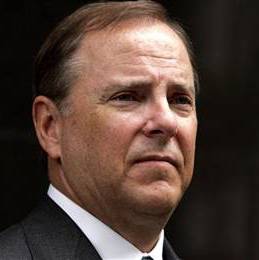 Got to love the response of Sri Srinivasan — who handled yesterday’s oral argument for Jeff Skilling in his appeal to the U.S. Supreme Court — to the government’s contention that a five-hour voir dire of the jury was sufficient in Skilling’s trial to rebut the presumption of community prejudice against Skilling.
Got to love the response of Sri Srinivasan — who handled yesterday’s oral argument for Jeff Skilling in his appeal to the U.S. Supreme Court — to the government’s contention that a five-hour voir dire of the jury was sufficient in Skilling’s trial to rebut the presumption of community prejudice against Skilling.
According to Lyle Denniston, whose account of the argument is the most comprehensive that I’ve seen, Srinivasan pointed out that the far less complicated criminal trial of Martha Stewart involved six days of juror selection in a case where there was no evidence of “deep-seated passion and prejudice” among jurors.
As Denniston notes, the SCOTUS Justices are usually hard to read during oral argument and the Skilling argument was no different. Jeffrey Toobin observes in his recent book on the Supreme Court, Supreme Court decisions are often more the product of coalition-building between the Justices than the legal theories.
From reading Denniston’s account and from talking with a couple of friends who attended the argument, I’m guessing that the Justices have already decided either to invalidate or dramatically limit the honest-services wire fraud statute (18 U.S.C. 1346), and that much or all of Skilling’s conviction will be overturned on that basis.
If I’m right on that, then the Justices are now only deciding whether to knock out Skilling’s conviction entirely on the District Court’s refusal to change venue from Houston or to conduct a thorough voir dire of jurors and leave the honest services issues for the other two pending cases involving the same issue.
But ignored among all the media reports on the Skilling SCOTUS argument is that the Skilling case is far from over even if SCOTUS were to uphold Skilling’s conviction. Put on hold pending the outcome of the SCOTUS appeal is the Fifth Circuit’s order to U.S. District Judge Sim Lake to re-sentence Skilling because of errors in the calculation of the length of the sentence.
But even more importantly, the Skilling team is awaiting the outcome of the Supreme Court appeal before filing what will certainly be a scalding motion for new trial in the District Court based on pervasive prosecutorial misconduct involved in the Enron Task Force’s prosecution of Skilling.
And that could well be more revealing than any Supreme Court argument.

This is a piece of logic regarding the Skilling case I may have presented before, but I’ve never seen it elsewhere.
It goes like this: Fastow’s “Global Galactic Agreement” is obviously a big peice of evidence per the trial. It was signed by Rick Causey. Causey pled guilty before the trial. Thus the prosecution could have called him to verify his signature since the agreement was a bit clouded by the fact it was a xerox copy bought late to the party. They didn’t. Why not?
I think because he would not so verify and would deny there was such an agreement. In fact I’d guess they didn’t even ask him for fear he might say no and they’d have to disclose it.
Whatchatink?